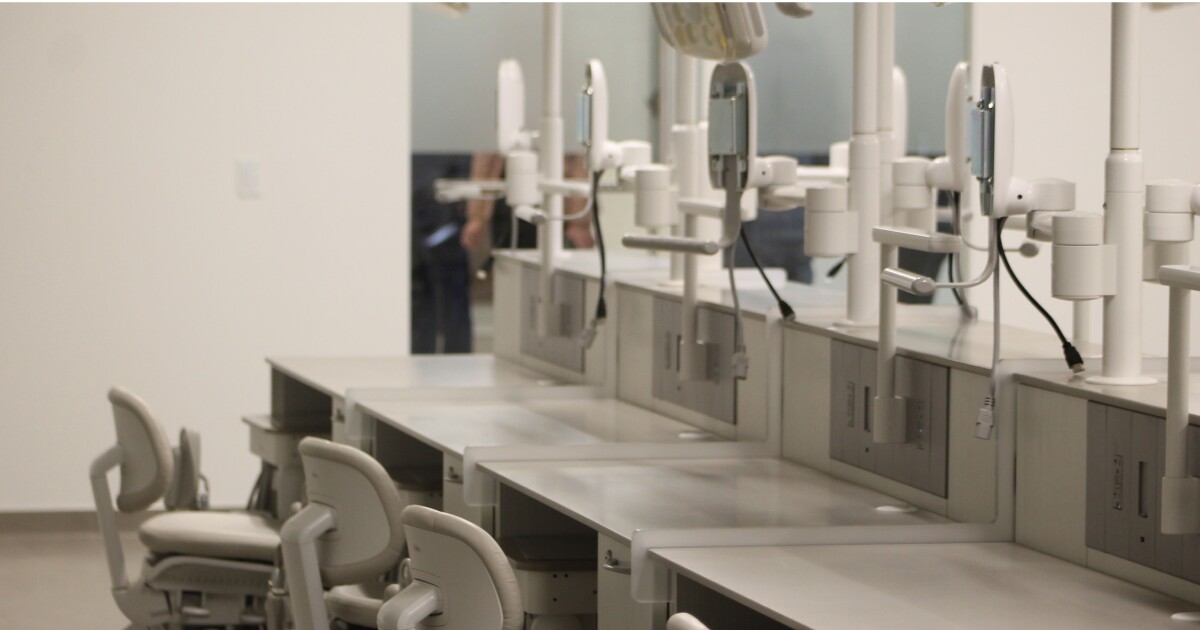South College on Wednesday officially unveiled its new Dallas campus in Farmers Branch focused on health care degrees and training programs.
The campus includes specialized training labs for nursing, medical imaging and dental hygiene. It also features a dental clinic where students will eventually provide dental care to community members for a discounted rate.
Kim Hall, vice chancellor at South College – a private institution with campuses across several states – said leadership was deliberate when it chose to expand to the Dallas area.
“This area very much needs health care workers, and we are heavy in health care programs,” Hall said at the campus’ ribbon-cutting event. “When we met with potential partners here, they were very receptive and very much in need of the programs that we offer.”
South College specializes in nursing, but Hall said it has a wide range of programs it offers, including respiratory therapy, radiology and surgery technology. It plans to expand those programs in the future. The Dallas location has about 10 programs currently, which include associate and bachelor’s degrees, as well as certifications.
“Students will come here largely to do lab work,” Hall said. “We have specialized labs for every program.”
The idea is that students will enter the clinical components of their training with more hands-on experience through labs and simulation, she said. Faculty also noted how this type of training can prepare students for testing, which was also taken into consideration when designing the campus.
Despite just opening the campus, some students are already in their degree programs.
“We already have just under 400 students enrolled here at the Dallas campus,” Hall said. “But it’s unlimited. I would expect within a year we’d easily have over 1,000 students, and I just expect it to continue to grow.”
Hall said she’s hoping to be able to offer graduate and continuing education programs through the Dallas campus in the future. The first group of students would likely enter the workforce around this time next year.
The campus includes specialized training labs for nursing, medical imaging and respiratory therapy. The simulation rooms include mannequins that are used to train students before they practice on live patients.
One of the key areas faculty and leadership highlighted is the school’s dental hygiene program, which includes a learning laboratory where students spend two quarters before practicing on live patients.
Rhonda Weatherbie, dental hygiene program director, said the learning space for students includes state-of-the-art equipment that not a lot of programs have. That not only gives students the time to practice on mannequins before seeing live patients, she said, but it also prepares them for their exams.
“Their national board exams are mannequin-based, so this really gives them that opportunity to learn what that exam looks like,” Weatherbie said.
The dental hygiene clinic is where students will treat community members for a “very reduced price.” The clinic includes 31 chairs and observation rooms for faculty.
Health education and community leaders said the discounted care offers a valuable resource for the community, while increasing the number of trained health care providers in the area.
A 2019 state report found demand for dentists and dental hygienists in Texas will outpace supply through 2030.
Weatherbie said South College is still waiting for a few steps in the accreditation process. She said she’s hoping to start accepting students next fall. Then it will be some time for the first class to be ready to practice on live patients.
Farmers Branch Mayor Terry Lynne said the city is a proud partner of the new campus, noting that it will address the growing need for opportunities for people to enter the health care field.
“We know that the folks that are going to school here, they’re going to be very, very productive members of society,” Lynne said. “What they’re doing is extremely needed. The skill sets that they’re learning here are very, very important.”

